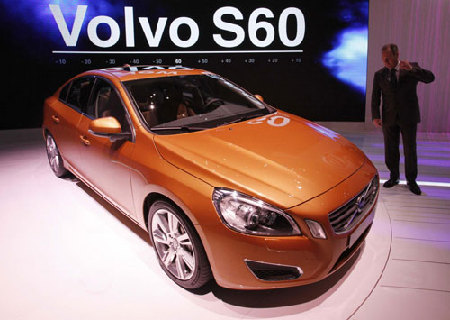|

|
|
The new Volvo S60 car is unveiled by Volvo Car Corp President & CEO Stephen Odell on the exhibition stand of Volvo during the first media day of the 80th Geneva Car Show at the Palexpo in Geneva March 2, 2010.[Agencies]
|
Volvo Car Corporation inaugurated its China headquarters in Shanghai on Jan 25, 2011 to increase its presence in the Chinese market.
It is reported that the China headquarters is similar in function to the headquarters in Sweden, and the China headquarters will directly report to Volvo Chief Executive Stefan Jacoby. With the China headquarters open in Shanghai, Volvo will officially launch its China market strategy.
Volvo China spokesman Ning Shuyong said: "The Volvo China headquarters is a branch of the headquarters in Sweden, but as China is the location of the Volvo parent company, the future Volvo China headquarters will be very different from other branches of the company. It will have more business and form a complete functional system."
Previously, Volvo's business in China mainly focused on sales, marketing and customer service. However, the new headquarters will foster a renewed focus on product design, manufacturing, quality control, procurement and investment.
"To set up a China headquarters means paying more attention to the Chinese market in the future," said Zeng Zhiling, an auto industry analyst with Shanghai-based Global Insight.
According to Ning, in February this year, Volvo will announce the establishment of a China Development Center as the next move of Volvo's in-depth localization strategy in China. The center is designed to increase support for localization.
The local development center will be different from its Swedish counterpart. While the research and development center in China will support the Swedish side, it will focus on designing products that are based on market demand in China and Chinese consumer preferences.
It is also learned that Volvo will release more specific strategic planning in the Chinese market. Its initial plan is for Volvo car sales in China to reach 200,000 by 2015 and its market share to rise to 20 percent.
After a series of personnel changes and recruiting, Volvo basically had its management team assembled by Aug 2, and has laid the basis for carrying out the Volvo China market strategy.
However, Ning could not comment at this time about location of the future Volvo plant in China.
Last year, Volvo reported 36.2 percent year-on-year sales growth, selling more than 30,000 vehicles in the Chinese market. But it still lags far behind its competitors — both in terms of growth and total sales.
Audi sold 226,000 units in China in 2010, up 43.5 percent year on year. Mercedes-Benz reported sales volume of 147,670 units last year, up 115 percent and BMW sold 169,000 units, up 87 percent in China.
Signs are showing that Volvo is preparing a frontal assault on the Chinese market, and its plan to set up a research center in the country indicates further domestication of the Volvo brand in China.
The general image of Volvo as a low-profile luxury car can gain ground in China, said Zhang Yu, an independent auto industry analyst, because "the image of Volvo is in accordance with the taste of the rising middle class in China."
Sun Wei, Volvo China's marketing director, said this feature of Volvo cars would remain for the future.
However, Zeng pointed out that luxury car buyers in China prefer larger cars, which are a far cry from Volvo's small, energy saving and environmentally-friendly cars. Therefore, Volvo needs to make adjustments to its products if they want to compete with other luxury cars in China, Zeng said.
Not long after Geely acquired Volvo, the Hangzhou-based carmaker proposed setting up three plants in China and increasing Volvo sales to 1 million units in five years.
Source: People's Daily Online
Editor: Xie Fang
|


